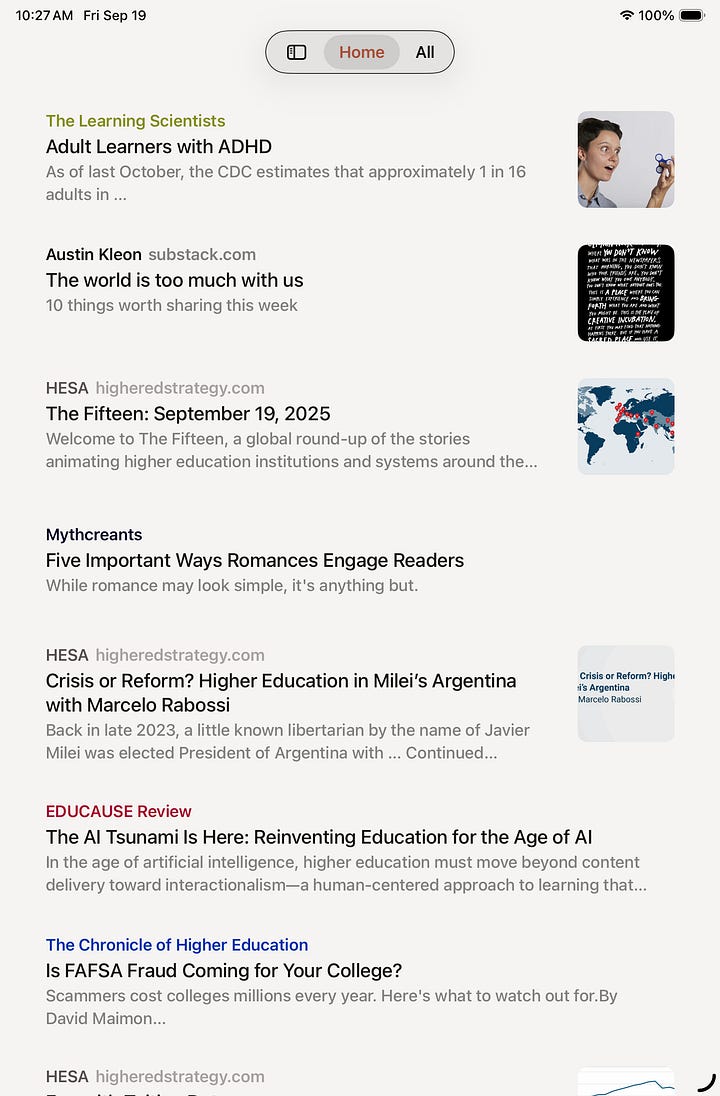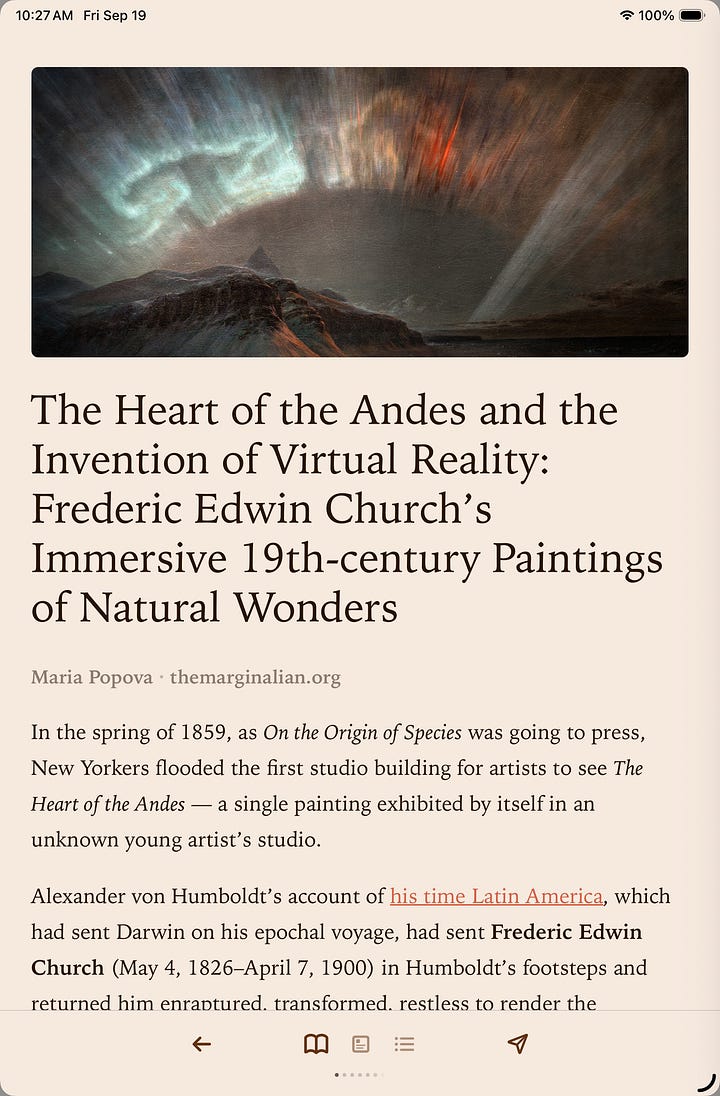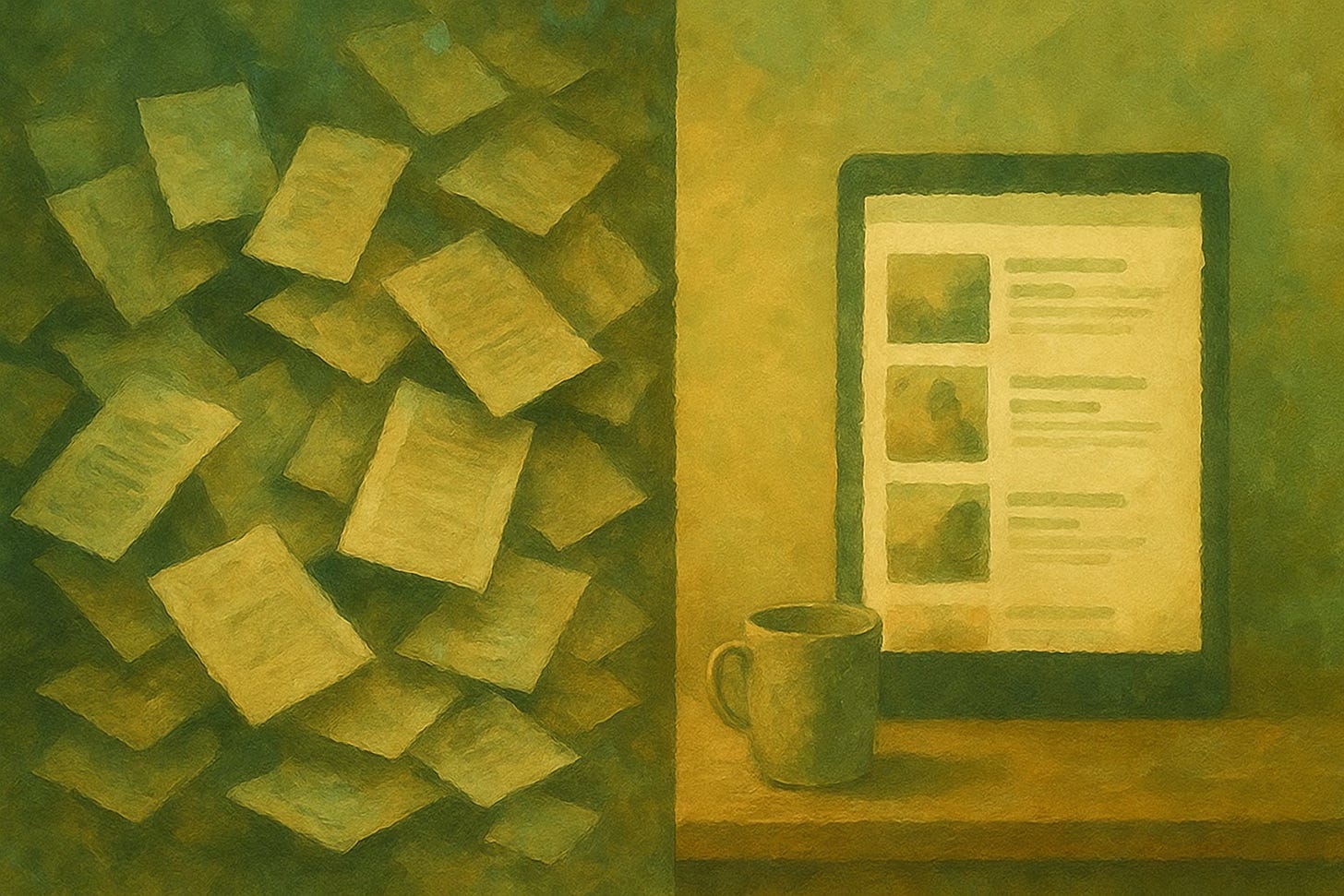Slaying the Algorithm Dragon
"I cannot brain today. I have the dumb."
That’s when it hit me. My attention span had collapsed. YouTube and short-form feeds had nerfed my tolerance for reading anything longer than a tweet. Fiction, the thing I love to read and write, was gathering dust. Even sub-2000 word articles felt like homework. I’d catch myself running AI summaries just to cope with the sheer effort of text.
Short-form video is a scourge upon humanity. Brain candy and outrage pornography. Even in the previously trusted channels, political partisanship and tribalism feeds aren’t any better. The “For You” algorithm promises diversity while serving up distortion and outrage. I stripped YouTube of recommendations by disabling search and watch history, installed the Unhook plugin and deleted the damned app from my phone. I killed off almost all social media. Facebook survived the cull for family connection. I keep LinkedIn around to service the lie I keep telling myself that it’s any better. I realized the real fix was deeper: kill the algorithm altogether.
This post is about how I rebuilt my attention by killing the algorithm and coming home to RSS. Step one: stop letting machines decide what I see. Step two: no video consumption and no news before noon. Step three: build a deliberate reading habit.
RSS = you pick sources; your reader delivers new posts.
Tools of the Trade
I’ve been an RSS nerd long enough to hold a small funeral for Google Reader (Google’s beloved RSS reader, shut down in 2013). I started with Feedly, then moved to Inoreader: powerful, feature-rich, full back catalogs and search. But there was a problem: it became another inbox. Reading shouldn’t feel like email.
Feeeed is my current home for RSS feed reading. It feels like a magazine you drop into, not an inbox to process. Recency over completion. I bookmark must-reads or push items in if needed, but mostly it’s just: here’s what’s new, read or don’t. Simple. Liberating.


My Current Roster
I keep five lanes so ideas collide on purpose. High-volume feeds correlate with low-quality noise, so this list is lean and deliberate.
You’ll note that I don’t follow any current events and overtly political feeds. I’m on a break from news at the moment. The impactful stuff still finds me, but I’m not white-knuckle riding the rage wagon.
Here’s the lineup.
Productivity / Systems
Cal Newport: cultural critique, deep work, productivity models. He has a podcast too, but it’s kinda repetitive. His essays are almost always worth the read.
JD Meier: Agile Results is my jam, also innovation and inspiration nudges. It’s not polished, but a unique voice worth keeping. JD has two other great blogs, but his canonical fits my vibe.
Ness Labs: mindful productivity and creativity, science-lite but practical.
Higher Ed / Strategy
EDUCAUSE Review: the big tent for higher-ed IT strategy, sometimes peppered with sponsored pieces. Still high value, though the side-eye remains.
HESA: daily analysis of Canadian higher-ed policy by Alex Usher. A little “doomy,” but sharp.
Chronicle for Higher Education Technology Tag: faculty and classroom voices on AI/tech, less firehose, more immediate.
AI / Tech Strategy
One Useful Thing (Ethan Mollick): research-driven, pragmatic AI in teaching and learning. Mandatory reading for everyone following the AI wave.
Benedict Evans: macro tech strategy and foresight. Solid and pragmatic.
The Gradient: longform essays, academic depth, irregular cadence. Pour a coffee to read.
AI as Normal Technology: conceptual framing for governance. Likely the right lens.
Pedagogy / Learning Science
The Learning Scientists: retrieval practice, spaced repetition, metacognition—durable learning science that keeps pedagogy grounded.
Creativity / Inspiration
Austin Kleon: short, playful sparks.
Maggie Appleton: cultural critique and visuals about the algorithmic internet. The Dark Forest essay is gold.
The Marginalian (Maria Popova): philosophy, literature, resonance. Been following since it was Brain Pickings.
Writing
Mythcreants: sharp critique and craft insights for worldbuilding. The back catalog is deep.
Helping Writers Become Authors (K.M. Weiland): structured craft systems and frameworks. I don’t always buy into her formulations, but there’s always something useful.
Signal vs Noise
These rules aren’t aesthetic; they protect the reading habit I rebuilt:
Diverse voices > echo chambers.
Low volume > constant churn.
Unique voice > polish.
Cull if: blatant shilling, preachy sermons, paywalls disguised as feeds.
That’s why I recently dropped the Center for Humane Technology. EDUCAUSE Review remains on watch for blending ads into content. JD Meier stays, even rough around the edges, because it doesn’t sound like anyone else.
The Ethos of RSS
The algorithm is making you numb and dumb. RSS is the antidote. It’s not about chasing every post. It’s about curating voices worth your time, and reading with intention instead of swiping away boredom on a slab of glass.
Since moving back to RSS, I’ve started reading long-form fiction again. Nonfiction still gets the AI-distillation treatment (because bloated prose is still bloated prose), but I’m not hunting for video explainers anymore. My attention is recovering. Reading feels natural again.
RSS is resistance. RSS is curation. RSS is freedom to think in patterns, not react in swipes.
If you want a head start, here’s my feed roster.







